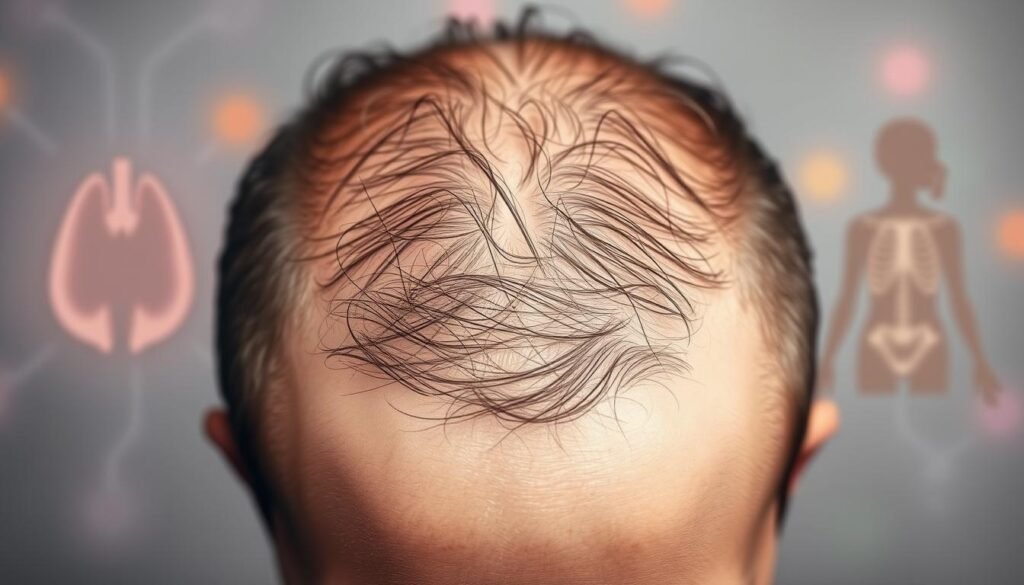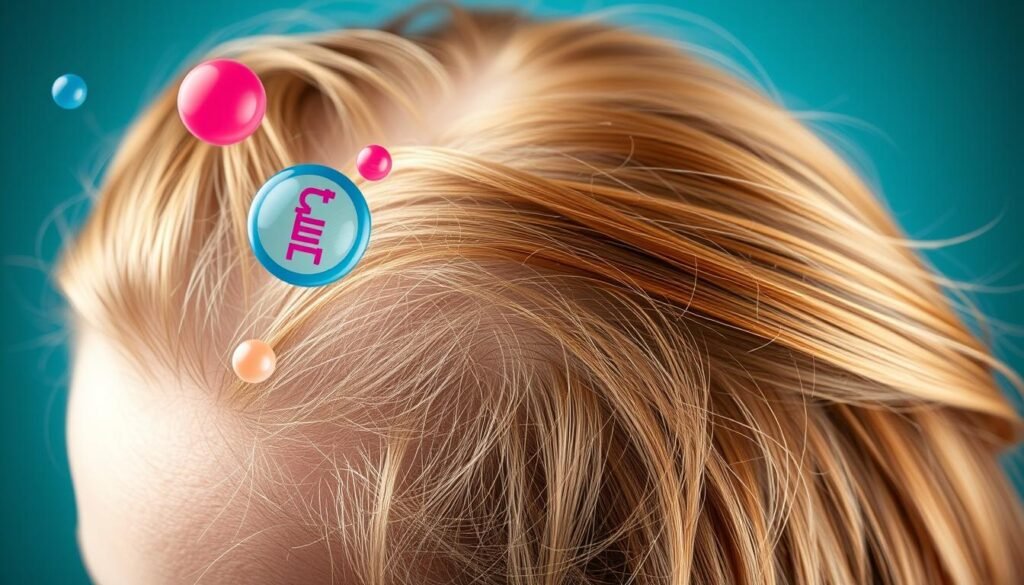By the time they reach 50, about half of all women and 40% of men will see their hair thinning. This often happens because of hormonal imbalances. Changes in hormones such as testosterone, estrogen, and cortisol affect our hair’s health. Learning about how these hormones work together and how their levels change can help. This knowledge is key for anyone looking for ways to treat and prevent hair loss due to hormone imbalance.
Key Takeaways
- Hormonal imbalances can significantly impact hair health and growth cycles.
- Testosterone, estrogen, and cortisol are key hormones associated with hair loss.
- Nearly half of the female population experiences noticeable hair thinning by mid-life.
- Understanding hormonal changes is crucial for effective hair loss treatment.
- Identifying the root causes of hormonal imbalances can help in preventing hair loss.
Understanding Hormones and Their Functions
Hormones help keep our bodies working well. They act as messengers, controlling growth, metabolism, and how we feel. Knowing about hormones and their functions is key. This knowledge shows us how imbalances can affect our health, especially our hair.
Key Hormones Involved in Hair Health
Several key hormones are vital for hair health. Androgens, like testosterone and DHT, impact hair growth cycles. Estrogens, more common in women, help with hair’s fullness and density. Thyroid hormones are important too; not having enough can cause thinning hair.
These hormones together affect not just hair growth, but its quality as well. Stress messes with these hormone levels, raising cortisol. This can harm hormonal balance and may lead to losing hair. Understanding these effects highlights why it’s crucial to keep an eye on hormone levels for good hair health.
Want to know more about how hormones impact hair health? Look into resources like hormones and hair loss. Or check out detailed guides, such as treatment options for hormonal hair loss.
What Are Hormonal Imbalances?
Hormonal imbalances happen when your body has too much or too little of certain hormones. Hormones are important in regulating many bodily functions, like how your body grows, processes energy, and how you feel. If your hormones are out of balance, you may feel different or notice changes in your health.
Many things can cause these imbalances. They include your age, how you live, and any health issues. Stress and poor eating habits also throw off your hormonal balance. It’s important to know these causes to spot hormonal imbalance symptoms.
Hormonal imbalances affect your body in many ways. They can change your weight, how well you sleep, your energy, and moods. For instance, changes in estrogen and progesterone can make you feel tired or moody. Imbalances in insulin can affect your blood sugar. Spotting these signs early can help manage and treat these issues.
| Hormone | Common Imbalances | Potential Symptoms | Effects on Body |
|---|---|---|---|
| Insulin | Resistance or deficiency | Fatigue, increased hunger | Blood sugar fluctuations |
| Estrogen | Excess or deficiency | Mood swings, irregular periods | Bone density loss |
| Testosterone | Low levels | Fatigue, depression | Decreased muscle mass |
| Cortisol | Chronic elevated levels | Weight gain, anxiety | Impaired immune response |
Common Symptoms of Hormonal Imbalance
Hormonal imbalances show up in many ways, affecting overall health. Knowing these symptoms is key to tackling the root problems. These include both physical signs and emotional effects.
- Weight gain or loss
- Fatigue
- Changes in skin condition
- Unusual hair growth or loss
- Irregular menstrual cycles
Emotional effects matter too. They involve feelings such as:
- Anxiety
- Depression
- Mood swings
- Difficulty concentrating
- Increased irritability
Grasping these symptoms helps in understanding their toll on our body and mind. It’s vital for figuring out how hormonal imbalances link to conditions like hair loss.
How Hormonal Imbalances and Hair Loss Are Connected
Hormonal imbalances and hair loss are closely linked because they affect the body’s natural processes. Androgens, which regulate hair growth, can cause hair to thin or fall out when out of balance. This happens when hormone levels are not normal.
Conditions like polycystic ovary syndrome (PCOS) and menopause can cause these hormonal changes. They may slow down hair growth or make hair enter a rest phase, leading to shedding. To understand more, a study looks into how hormonal changes affect hair over time.
To see this connection clearly, look at the table below. It shows how certain hormonal changes impact hair health:
| Hormonal Change | Effect on Hair Follicles | Impact on Hair Growth Cycle |
|---|---|---|
| Increased Androgens | Miniaturization of hair follicles | Shortened anagen (growth) phase |
| Estrogen Deficiency | Weakened hair structure | Extended telogen (resting) phase |
| Elevated Cortisol | Impaired follicle function | Disruption of normal cycles |
Understanding the link between hormones and hair loss helps us find treatments. By addressing hormonal issues, we can improve hair follicle health. This may help hair grow naturally again.

Hormonal Imbalances in Women: A Closer Look
Hormonal imbalances in women bring unique challenges. These occur during key stages like menopause and pregnancy. Fluctuations may cause symptoms such as hair loss.
Menopause marks the end of reproductive years for women. It leads to major hormonal shifts. Estrogen and progesterone levels drop, causing symptoms like hot flashes and mood swings.
The changes can be hard to handle. Women may notice their hair becoming thinner and losing its texture.
Pregnancy causes its own set of hormonal changes. Some women see their hair get healthier during pregnancy. But after giving birth, the return to normal hormone levels can result in hair loss.
Polycystic ovarian syndrome (PCOS) is linked to hormonal imbalances too. It can mess with insulin and boost androgen levels. This might cause thinning hair or hair growth in unusual places.
| Condition | Hormonal Changes | Impact on Hair |
|---|---|---|
| Menopause | Decline in estrogen and progesterone | Hair thinning and loss |
| Pregnancy | Increase in estrogen | Enhanced hair growth |
| Postpartum | Drop in pregnancy-related hormones | Increased hair shedding |
| PCOS | Elevated androgen levels | Thinning hair on the scalp |
Managing hormonal imbalances is key for women’s hair health. Knowing these conditions and their effects is important. It helps create good strategies for dealing with hair loss.
Identifying Hormonal Imbalance Causes
Understanding what causes hormonal imbalances is key to staying healthy. Many things, like how we live, our health, and our surroundings, can mess up our hormones.
Some common hormonal imbalance causes are:
- Not eating right can make it hard for your body to make hormones.
- Too much stress raises cortisol, which can mess up other hormone levels.
- Not moving enough can lead to weight issues, affecting hormones like estrogen and testosterone.
Then, there are medical conditions that can make things worse, such as:
- Thyroid problems can make your hormone levels too high or too low.
- Polycystic ovary syndrome (PCOS) messes with the hormones tied to reproduction.
- Adrenal gland issues can throw off the hormones that manage stress and metabolism.
Stuff around us, like chemicals in pesticides and plastics, can also upset our hormones. These, along with our lifestyle choices, mix together and affect our hormonal balance.
| Factor | Impact on Hormones |
|---|---|
| Poor Diet | Disrupts nutrient intake necessary for hormone synthesis |
| Chronic Stress | Elevates cortisol, lowering reproductive hormones |
| Lack of Exercise | Contributes to weight gain, affecting hormone levels |
| Thyroid Disorders | Alters metabolism and energy levels |
| Environmental Toxins | Interferes with hormone signaling |
Impact of Stress on Hormonal Balance
Stress and hormones have a deep connection that affects our health. When stressed, our bodies react by making more cortisol. This “stress hormone” greatly changes our hormonal balance.
Being stressed for a long time harms the balance of hormones in our bodies. High levels of cortisol stop the production of other hormones and worsen hormonal imbalances. These issues can lead to problems like hair loss.
Stress also makes hormonal fluctuations more severe. Symptoms like anxiety, fatigue, and irritability become more common with high cortisol levels. These symptoms make it hard for people to choose healthy lifestyles. This creates a bad cycle, with stress causing more stress.
Understanding the relationship between stress and hormones helps us look after our health better. Knowing this allows people to find ways to reduce stress. This can help keep hormones in balance and improve hair health.
| Factor | Effect of Stress | Hormonal Response |
|---|---|---|
| Chronic Stress | Increases cortisol levels | Disrupts other hormones |
| Elevated Cortisols | Negative impact on mood | Impedes hormone production |
| Stress Management | Reduces cortisol | Regulates hormonal balance |
Hormonal Changes and Hair Loss: The Underlying Mechanisms
The link between hormones and hair loss is complex. Hormones are key in controlling hair growth. Changes, especially in androgens like testosterone, can cause androgenic alopecia. This type of hair loss hits men and women.
Things like pregnancy, menopause, or thyroid issues can throw hair into a long rest. When this happens, hair starts to fall out more and get thinner.

Research has found that hormone shifts change how certain genes work. These genes help control the hair follicle. So, when hormones are out of balance, it can hurt hair growth.
| Hormone | Impact on Hair Follicle | Associated Hair Loss Condition |
|---|---|---|
| Testosterone | Reduces hair follicle size, shortening growth cycle | Androgenic Alopecia |
| Estrogen | Promotes hair growth and prolongs growth phase | Postpartum Hair Loss |
| Thyroid Hormones | Regulates metabolic processes in hair follicles | Telogen Effluvium |
Getting to know how hormones and hair loss are connected is important. It helps people facing hair loss understand their situation better. Knowing about hormone effects can lead to better treatments and healthier hair.
Hormone Imbalance Treatment Options
Fixing hormone imbalances needs more than one approach. Both medicine and changes in your life are key. They work together to ease symptoms and make you healthier.
Medical treatments include hormone replacement therapy. This method balances your hormones. It can make life better, especially for those with big hormone swings. Doctors suggest keeping an eye on your treatment to get the best results.
Changes in lifestyle are just as crucial. Eating right and staying active can help balance your hormones. These steps improve not just your hormone health but your overall well-being, too.
Using both methods together often works best. A plan made just for you will help the most. It’s important to team up with your doctor. This way, you can tackle your hormone imbalance in the best way possible.
| Treatment Option | Description | Benefits |
|---|---|---|
| Hormone Replacement Therapy | A medical intervention that supplements or replaces hormones. | Reduces symptoms of deficiency, such as fatigue and mood swings. |
| Dietary Modifications | Adjusting food intake to include nutrient-rich, hormone-supportive foods. | Improves overall health and hormonal balance. |
| Exercise Regimen | Engaging in regular physical activity tailored to individual capabilities. | Boosts metabolism and enhances hormone regulation. |
| Stress Management Techniques | Practices such as yoga, meditation, and deep breathing exercises. | Reduces stress levels, which can influence hormone balance. |
Natural Remedies for Hormonal Imbalance
Exploring natural remedies is a good step for hormone imbalances. Many women and men look for effective solutions. They want remedies that support overall well-being.

Using herbal treatments every day brings benefits. Herbs such as ashwagandha, maca root, and black cohosh help with hormones. They can improve balance and vitality.
Lifestyle approaches like exercise and good nutrition are essential. Exercise helps manage hormones, mood, and stress.
Consider these lifestyle approaches:
- Eat a balanced diet with lots of whole foods, fruits, and veggies.
- Drink water to keep your body working well.
- Use mindfulness techniques like yoga or meditation for stress.
- Get enough sleep to help regulate hormones.
Using herbal treatments along with these strategies can help. It might improve mood, energy, and hair health. It’s about finding balance.
Different methods work differently for everyone. Working with healthcare providers and regular checks can make these natural remedies more effective.
| Natural Remedy | Benefits |
|---|---|
| Ashwagandha | Reduces stress and boosts energy. |
| Maca Root | Boosts hormonal health and energy. |
| Black Cohosh | Eases menopausal symptoms. |
Hormonal Hair Loss Treatment: What Works?
There are many ways to tackle hormonal hair loss effectively. Treatments range from meds to advanced clinical options. Knowing the options helps people choose what’s best for them.
Meds often play a big role in treating hormonal hair loss. Finasteride and spironolactone are widely used. Finasteride stops testosterone from turning into DHT, a hair loss hormone. Spironolactone lowers DHT levels, helping women with hair thinning.
Minoxidil is a topical treatment that has FDA approval. It works well for hair regrowth if used twice a day. It’s good for both men and women looking to fight hair loss.
Low-level laser therapy (LLLT) is another modern choice. It uses lasers to boost follicle health and hair density, without surgery. Studies show it helps grow hair and users find it easy to tolerate.
In conclusion, there’s a wide range of effective treatments for hormonal hair loss. Below is a table comparing different treatments, how they work, and their benefits.
| Treatment Option | Mechanism | Target User | Effectiveness |
|---|---|---|---|
| Finasteride | Inhibits DHT formation | Men | High |
| Spironolactone | Acts as an anti-androgen | Women | Moderate to High |
| Minoxidil | Stimulates hair follicles | Men and Women | Moderate |
| Low-Level Laser Therapy | Promotes follicular health | Men and Women | Moderate to High |
Conclusion
Understanding hormonal imbalances is key in tackling hair loss. Hormones majorly impact hair growth and health. By knowing how hormones and hair health link, we can better address hair loss.
Improving hormonal balance can involve seeking medical advice, making lifestyle changes, or using natural remedies. It’s crucial to look at all factors that might disrupt hormones and lead to hair loss. This helps in crafting a thorough treatment approach.
Paying attention to hormone health boosts hair vitality and supports overall well-being. For more on hormones and hair loss, read detailed research findings here.